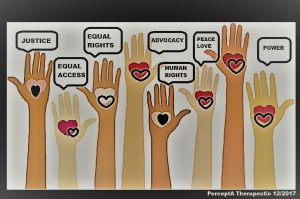
The Relevance of Social Justice Advocacy for Counselors Today
by Chioma Anah, Ed.D., NCC, LCPC-S, ACS
“In these days of difficulty, we Americans everywhere must and shall choose the path of social justice…, the path of faith, the path of hope, and the path of love toward our fellow man.”- Franklin D. Roosevelt
Social Justice Advocacy is extremely relevant today, due to: The extraordinarily difficult political and social circumstances we live in today; the continued disenfranchisement of large segments of society based on class, race, sexual orientation, gender, nationality, immigration status, religion, mental health status, and socio-economic status; and the mental health issues caused by social marginalization. This article works to highlight the relevance of social justice advocacy today in counseling, and calls attention to additional ways counselors could become better advocates in their work with diverse, marginalized and oppressed clients, through a call to action.
Sadly, we are being subjected to a current administration, whose agenda, it seems, has been focused on unleashing a series of unjust legislations and policies that threaten the rights of women, older adults, LGBTQ members of society, immigrants, and many less powerful members of society. We cannot also forget that we continue to live in a society in which not all its members have equal rights, equal access and opportunities to freely achieve everything that they are capable of doing, and to be able to fulfill their dreams no matter their background. Furthermore, we have large segments of the population who are challenged with mental health issues and traumas, due to being subjected to many social conditions such as discrimination, poverty, powerlessness, oppression and disenfranchisement. The realities we live in today’s society makes social justice advocacy even more relevant for us as members of a human family, as well as part of the counseling profession.
Social justice advocacy issues has always been part of the counseling profession from the beginning of its inception, and building Multicultural Counseling Competency (MCC) and a social justice advocacy orientation among counseling trainees are fundamental goals across counseling programs (Pieterse, Evans, Risner-Butner, Collins, & Mason, 2009). For professional counselors today, the American Counseling Association’s (2014) ACA Code of Ethics and the Council for Accreditation of Counseling and Related Educational Programs’ (CACREP) 2016 Standards clearly highlight the critical need for counselors to enhance cultural sensitivity and responsiveness when working with clients from diverse backgrounds. Specific ethical guidelines for counselors include to, “advocate at individual, group, institutional, and societal levels to address potential barriers and obstacles that inhibit access and/or the growth and development of clients” (ACA, 2014, p. 5). Similarly, CACREP (2016) inform counseling practitioners in providing services to diverse, marginalized and oppressed populations in multicultural and social justice competent ways. CACREP (2016) also complements the ACA Code of Ethics, by featuring curriculum standards for counseling trainees within the areas of knowledge, skills, and clinical practice when working with culturally diverse populations. Furthermore, the Multicultural and Social Justice Counseling Competencies (MSJCC) provides a more detailed theoretical culturally contextual framework, and recommend interventions from both individual and systemic levels (Ratts, Singh, Nassar-McMillian, Butler, & McCullough, 2016). From all these guidelines, it is clear that competent counselors are expected to approach their clients as cultural beings who exist within contexts and systems, as well as incorporate social justice advocacy into their counseling practice. All counselors want the best for their clients, and should understand the important forces of oppression, inequality, and marginalization at play in their lives.
The relevance of social justice advocacy cannot be denied in today’s society. It is clear that, the current ethos of the world has significantly spiked the anxiety levels of many clients, and counselors. It is also important to be aware that, the most vulnerable members of society, and those that are disenfranchised and subjected to social traumas, are often afflicted with mental health issues; there is clearly a relationship between people subjected to social trauma and psychological distress and human dysfunction. Counselors are needed, to respond to this important work of social justice advocacy. Albert Einstein said it best when he stated, “Striving for social justice is the most valuable thing to do in life.” With this in mind, here is A Call to Action to all counselors:
1. To better meet the needs of our clients and create a healthier society, it is important for counselors to actively contemplate social issues, become better informed with not just domestic or local issues, but be better global citizens. Counselors should expand their knowledge base, in order to challenge injustice, and ultimately empower and provide resources for their clients to challenge the inequality and injustices in their lives.
2. Issues of social justice are important in counseling because our clients inherently exist within social and cultural systems and contexts. As counselors, to be “neutral” or “value-free” about one’s political views, is inherently an endorsement for the status quo; a stance for being apolitical within your counseling process, is not necessary a view that is helpful to clients, particularly when that client is a member of a historically marginalized group. Counselors are in positions of power and privilege to be the voice for those historically marginalized, and have to strive to work from a social justice advocacy and empowerment perspective in order to work with their clients in these times of uncertainty and high anxiety. As counselors, we must address the client’s experiences of oppression, powerlessness, and marginalization, as well as ways they can cope and strive towards healing.
3. Within the counseling relationship, working towards a successful therapeutic outcome for your marginalized and oppressed client through empowerment and active social justice advocacy is not “divisive” nor partisan, and counselors have to establish and maintain successful counseling relationships with clients from diverse backgrounds and cultural context, by being aware of the social justice needs of their clients, which are critical to their dignity and their therapeutic change.
4. The Universal Declaration of Human Rights, is a very important document for everyone, especially counselors, to read.
5. Lastly, counselors should be more active, vocal, and join organizations that focus on human rights and social justice advocacy causes. The Maryland Counseling Association is currently working on an initiative to start a Social Justice Division; Maryland Counselors for Social Justice (MCSJ). All those interesting in joining for membership can contact: Dr. Anah @ Email: drchiomaanah@gmail.com“To be just, it is not enough to refrain from injustice. One must go further and refuse to play its game, substituting love for self-interest as the driving force of society.”- Pedro Arrupe, S. J.
References
American Counseling Association. (2014). ACA code of ethics. Alexandria, VA: Author.
Council for Accreditation of Counseling and Related Educational Programs. (2016). Accreditation manual. Alexandria, V
Pieterse, A. L., Evans, S. A., Risner-Butner, A., Collins, N. M., & Mason, L. B. (2009). Multicultural competence
and social justice training in counseling psychology and counselor education: A review and analysis of a sample of multicultural course syllabi. The Counseling Psychologist, 37, 93-115. Doi:10.1177/0011000008319986
Ratts, M.J., Singh, A.A., Butler, S.K., Nassar-McMillian, S., & McCullough, J, R. (2016) Multicultural and social
justice counseling competencies: Practice applications in counseling. Counseling Today retrieved https://ct.counseling.org/2016/01/multicultural-and-social-justice-counseling-competencies-practical-applications-in-counseling/

